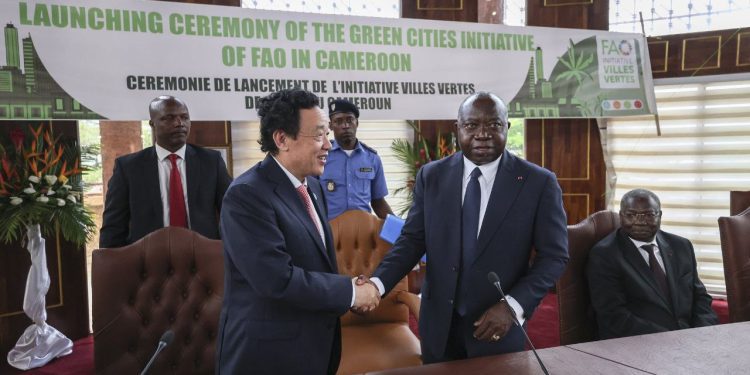The United Nations Food and Agriculture Organisation (FAO) has launched the Green City Initiative in Cameroon, marking a significant step towards creating sustainable and resilient urban environments in the country.
The initiative, aimed at improving access to healthy environments and diets from sustainable agri-food systems, was launched in collaboration with seven city councils in Cameroon.
An agreement to this effect was signed on April 21 in Yaounde by the Minister of Decentralization and Local Development, Georges Elanga Obam.
The Green City Initiative focuses on integrating agriculture, forestry, and agri-food systems into national policies to create sustainable cities that ensure food security, improve public health, and create green jobs.
It seeks to address pressing challenges faced by urban areas worldwide, including environmental degradation, waste management, and urban inequality.
During the launch event, FAO Director-General, Qu Dongyu, emphasized the importance of municipalities in addressing citizens’ needs for better livelihoods.
He highlighted the critical role of cities in confronting the multifaceted challenges posed by climate change and environmental degradation.
“These abilities are at the Frontline of the citizens expectations to improve the livelihood. From nutrious food, adequate water energy, housing, education, we are always addressing the multiple challenges such as environmental degradation, waste management and green jobs inequalities amongst others,” Dongyu said.
“That is why we launched the green city initiative in 2020. We need a far fetching and a long term commitment for the future and the generation to come. We also need all types of green life to make our lives more nature, more environment friendly and more sustainable.”
The FAO Green Cities Initiative, launched globally in 2020, envisions vibrant and inclusive cities where urban green spaces catalyze climate resilience, social cohesion, and economic prosperity.
It aims to bridge the gap between urban and rural areas and between citizens and nature.
Building on FAO’s expertise in sustainable urban and peri-urban agriculture and forestry, the Green Cities Initiative supports local governments in planning, designing, and implementing innovative green actions.
These actions bring together efficient, inclusive, resilient, and sustainable agrifood systems, multifunctional green infrastructure, and natural resources management.
The initiative seeks to improve the livelihoods and well-being of urban and peri-urban populations in at least 100 cities globally, including 15 metropolitan, 40 intermediate, and 45 small cities, by 2030.
It aims to have 1,000 cities join the initiative by the same year.



